While Alex Garland is best known for science-fiction and horror (Ex Machina, Annihilation, Men, Devs), the writer/director took a realistic approach to societal collapse with last year’s blistering Civil War.
Now, he presents an even more authentic portrait of battlefield carnage and chaos with Warfare. Now in theaters, it’s a harrowing real-time drama about a U.S. Navy SEALs unit that, in 2006 Iraq, finds itself surrounded by enemies in a residential house. Co-directed by Ray Mendoza, a veteran (and long-time cinematic military advisor) whose experiences are the basis for its story, it’s a breakneck you-are-there nightmare marked by meticulous attention to moment-to-moment detail.
Having initially partnered on Civil War, Garland and Mendoza thrust viewers into the eye of the storm in Warfare, whose soldiers—played by a who’s who of young actors, including Will Poulter, Cosmo Jarvis, Joseph Quinn, Michael Gandolfini, D’Pharoah Woon-A-Tai, Noah Centineo, and Charles Melton—strive to survive an all-out attack.
From eerie calm to shellshocked disorder to desperate gung-ho mayhem, the film situates itself alongside its characters as they act and react to their grim, ever-changing circumstances, capturing their confusion, suffering, and heroism with up-close-and-personal immediacy. As an experiential affair, it’s a gut-punch—or rather, a series of concussive blows, as it rarely lets up once the you-know-what hits the fan and its protagonists are compelled to do whatever’s necessary to make it out alive.
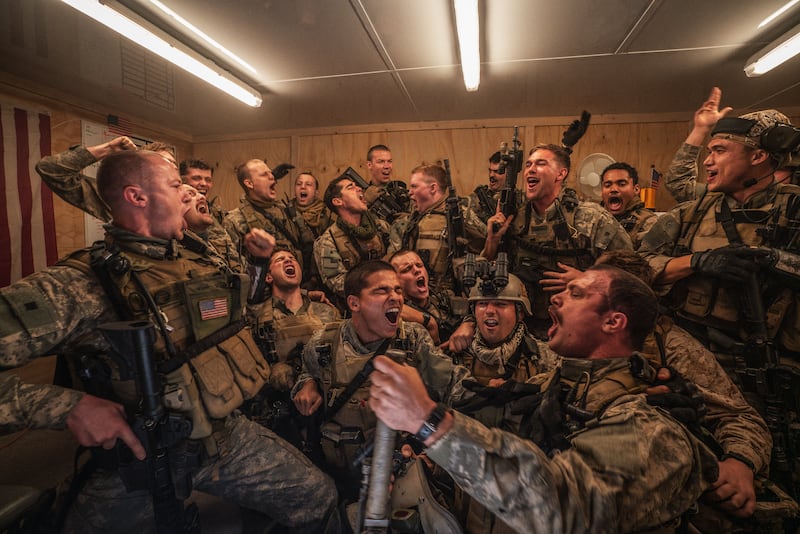
As with their prior collaboration, Warfare eschews overt political sermonizing; its focus is on the brotherhood that bonds military personnel. Shot in IMAX to maximize its muscular impact, it leaves one feeling battered and bruised, if also heartened by its snapshot of service men in dire straits risking everything for each other. We spoke with Garland and Mendoza about the origins and politics of their latest, the ins and outs of co-directing, and the challenge of presenting a genuinely true-to-life vision of war.
Civil War was a political film, if not in the way some critics and online commenters perhaps expected it to be.
AG: Or wanted it to be. But life is political. To be honest, almost any statement is political. Sometimes it’s by inference, and sometimes it’s a flag, or sometimes it’s just by virtue of existing. I think the same criteria could move easily from Civil War to this film.
How political do you view Warfare—or rather, in what way is it political to you?
AG: We approached it as simply trying to create as accurate a document as we could, and to not editorialize it. We had a dogma-like rule, which is that we weren’t allowed to invent stuff or conflate characters or compress time. You could reduce that to, we weren’t allowed to editorialize. In recreating any neutral and truthful sequence of events, anybody receiving that sequence of events can draw inferences from it based on their own lived experience or people they know or their sense of the world and how it works. Civil War works in the same principle, and actually, even Ex Machina works in the same principle.
In the old days when I started, you used to have to smuggle ideas past studios. That’s how it worked. The filmmaker conversation would always be, treat the audience like adults; assume that they will be nuanced and able to get it. Sometimes from studios, the phrasing was, dumb it down and make it clear. Don’t be ambiguous.
Has that changed at all?
AG: It feels like that sensibility in the last few years—and I think this is a product of the way media works these days—has migrated from the studios. They are no longer the gatekeepers. There’s a whole bunch of other gatekeepers who take that position instead. All I can say is, I didn’t agree with it in the studio days, and I still don’t agree with it now. I don’t care who is trying to be the gatekeeper. I make an assumption that I am working on projects with people for the benefit of adults who have brains and the capacity to be nuanced.
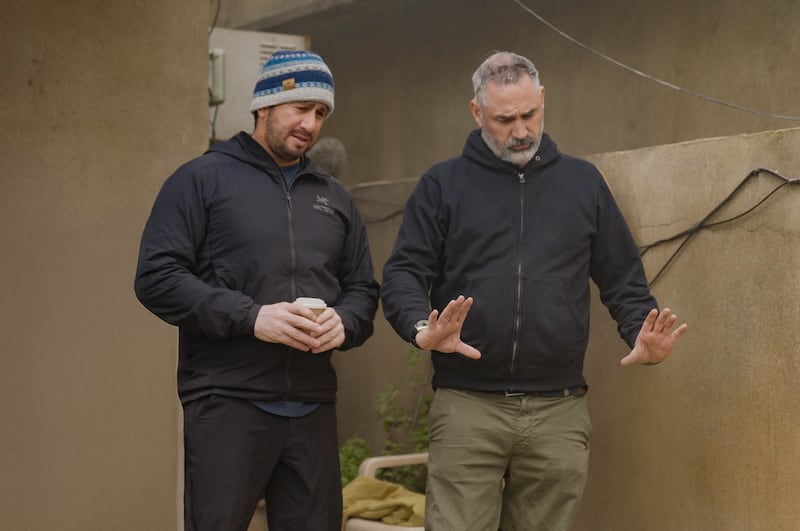
Ray, what made you want to revisit this particular incident?
RM: Let’s start back with my perception of war movies while serving, or even how I viewed them prior to service. I viewed them as entertaining, and very glorifying. Like, oh wow, that’s what war is.
I joined the Navy, joined the SEAL teams, went to war, and now you start to look at it through a different lens. You start looking at it with regards to authenticity, and you’re like, eh, that’s not how it is. Or no, that’s not how it feels. Sure, cool action scene, but it’s just not how it feels. It’s not how it is. If you watch a movie with a veteran, they hate us because they’re like, that’s bulls–t [laughs].
I can see that.
RM: This story has been on my mind because it is a part of my life. Elliot, played by Cosmo Jarvis, doesn’t remember what happened. He’s got questions about it, from big—you know, why were we there?—to the little questions of what color was the house, and things like that. I’ve always wanted to do something for him. We were all there. We know what it looks like. But I can only imagine his imagery is not the same. There’s a lot that went down. Our narratives are singular; they’re not slotted together.
Warfare feels real in a way that few military films do. Were there elements or devices from prior movies that you wanted to actively avoid?
RM: There’s something to be said about learning the wrong way to do things. You don’t have to always learn something good; learning’s learning, whether it’s the wrong or right way to do something. Things I wanted to avoid—there’s not a lot of dialogue or character development. To your point, there’s not always some guy saying some cool clichéd tagline in the middle of a firefight, you know what I mean? That doesn’t happen.
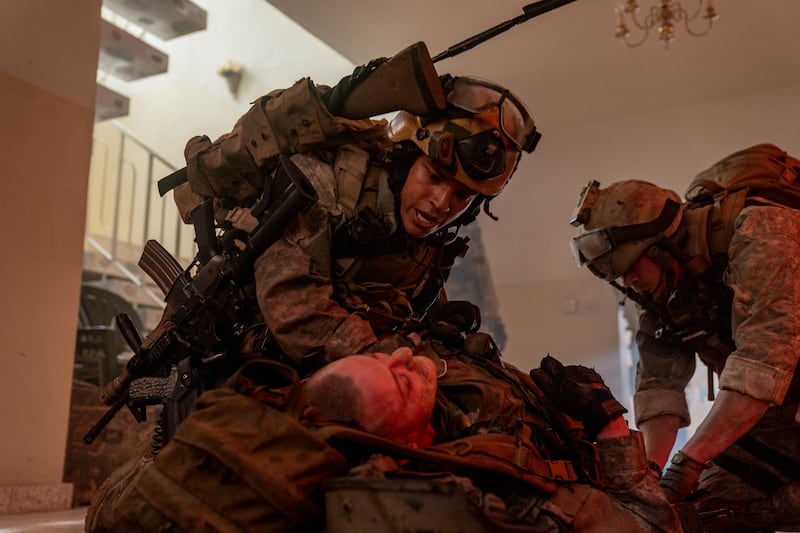
You’re so right about that.
RM: When you start to remove that, there’s a lot of subtext. I’m able to communicate with somebody I’ve been in combat with for ten years—I can just look at him, and look at his body posture, the situation that we’re in, and know what he’s thinking, know what he’s about to do, and know what my reaction is going to be when he does make that move.
I think what resonates with veterans is there are a lot of looks that are going on, and there are these non-verbal communication things that are going on. For most people, you have to fill in those blanks. I think a lot of veterans, there are probably many ways they can relate to this film, and I think that’s one of them—that it’s not over-clichéd taglines to sound cool.
Alex, when we spoke last year for Civil War, you talked about gravitating away from directing in favor of screenwriting. You’re both credited as co-writers and co-directors, so how did that partnership work, in terms of separation of duties?
AG: It actually relates to the conversation you guys were just having, which is that the differentiator with this film is that it’s an unfiltered account by a veteran, and the cinematic constructs and devices are not trying to manipulate that or stand in the way of it or alter it or over dramatize it. It’s just simply, listen and repeat in cinematic form.
As for our partnership, a lot of it worked like this: Ray would explain something, and I would try to listen to it and understand it as best as possible and then the two of us would discuss how to execute it. That began in the writing process, where Ray and I sat for a week and Ray downloaded everything he could remember and I would ask questions like, I don’t understand this acronym, or can you explain this process, or can you unpack that a little bit more. At the end of that, there were many, many, many pages of notes that could get structured in screenplay form. You know, “Interior Sniper Room. Day,” effectively.
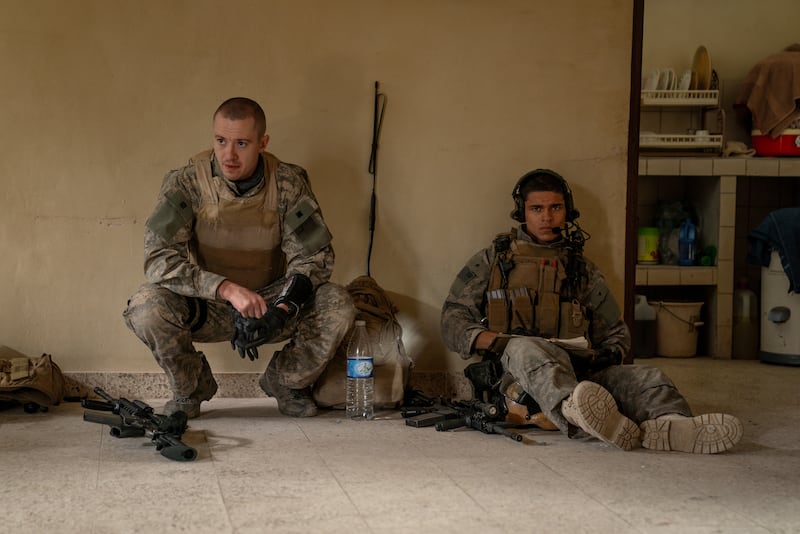
Was your working relationship the same on set?
AG: Directing, I absolutely stepped back, and this is the area where I stepped back. An enormous amount of directing has to do with not telling people what to do, but answering their questions. That could be actors, it could be production designers, it could be a gaffer—anybody, really. The person who had the answer to those questions was Ray.
In particular, when it came to the actors, their performance, not just how they’re trained but also what they are trying to convey, that was very, very squarely in Ray’s domain. There was no point in an actor asking me that question, because my only answer would be to repeat something Ray had previously told me. So going to Ray was the simple part of that.
The script doesn’t hold the audience’s hand when it comes to military terminology, whether it’s what the soldiers are relaying to each other or the radio comm terms used throughout. Was it tricky to balance that, so you’re being accurate and yet not confusing the audience?
AG: The film cannot be concerned with explaining that kind of thing, because to do so would be to break the rules. It might help the audience if a soldier spoke about his girl back home or the fact that it was his last tour, but it would completely break the terms under which the film was conceived and made.
In a way, that was also quite liberating. You don’t have to talk about a score because there isn’t going to be a score. The only thing we used to struggle with, I would say, was how to execute something—we could use a Bradley tank, but we can’t get a Bradley tank, so we have to take a British tank and bolt some things on and create a different kind of door. Those kinds of things. Or, when we had memories that were in conflict with each other, which sometimes happened. How do we find out which of these memories is the reliable one? Always, how do we get as close as possible to the truth of the moment?
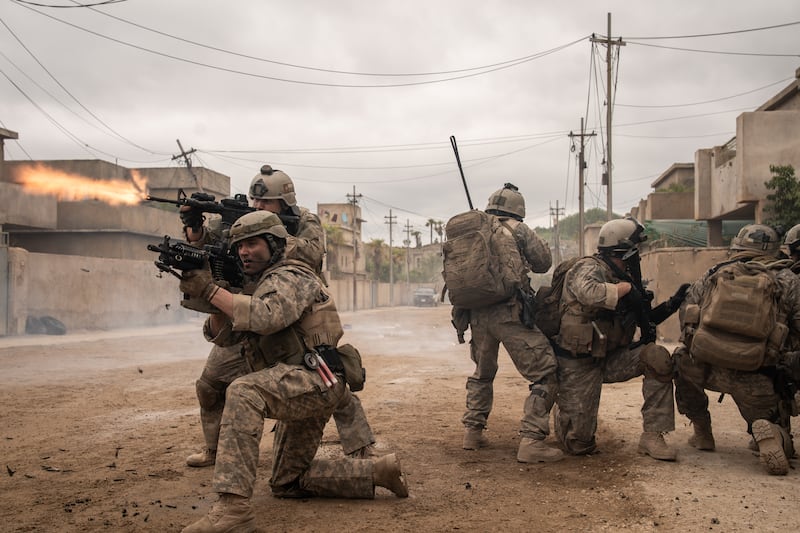
Can you speak about your approach to the film’s sound design, which is integral to its impact?
RM: Obviously, I’ve been in a lot of gunfights. I know what it sounds like to be shot at; most veterans do. You can say that is interpretive. What a snap sounds like when it goes by your head—there are different types of snaps. When a round snaps, when it doesn’t snap, why a round whizzes versus thumps—all that’s there as well.
When you read books on psychology, you learn that when people are afraid, things tend to be gray. If you ask people what color things were in a traumatic event, they often can’t tell you. Your senses start to decline. Your dexterity goes away. You can’t hear things very well. Your brain is on a low bandwidth operating mode, and that’s why we train so much. I did three magazine changes. Don’t remember it. But they had to be three magazines of mine. I was like, I don’t remember doing that s–t.
It’s the same with sound. Sounds come in and out when you’re coming in and out of adrenaline rushes, and you’re afraid and then bounce back and are operational again. Depending on what your brain needs to survive, that’s what it gives you. You may not need sound or to be able to determine color; you just need to be able to, like, put a tourniquet on. It’s interesting how the brain works, to survive these things.
It’s another key facet of the film’s intense realism.
AG: The sound is like everything in the film—it’s all attempting to replicate something that was explained. To unpack it slightly, in Ray’s account of finding Elliot after the IED, he was wearing headphones that were transmitting chatter into his ears constantly. But he wasn’t aware of it. There was a point, as he was explaining it, where he said, I became aware of the radio chatter in my ear as I started to become aware of incoming rounds and started to drag Elliot. So that’s what the film does.
The core principle was not being allowed to be cinematic and to editorialize, but just to listen and repeat. That was the intention. Now, there’s a whole bunch of other expertise that Ray can bring. But if I could convey one thing about the film, it’s that it’s trying to be as honest as it is able to be with the memories of the people involved.
This interview has been edited for length and clarity.
The post ‘Warfare’: The Making of the Most Blistering, Realistic War Movie in Years appeared first on The Daily Beast.



















